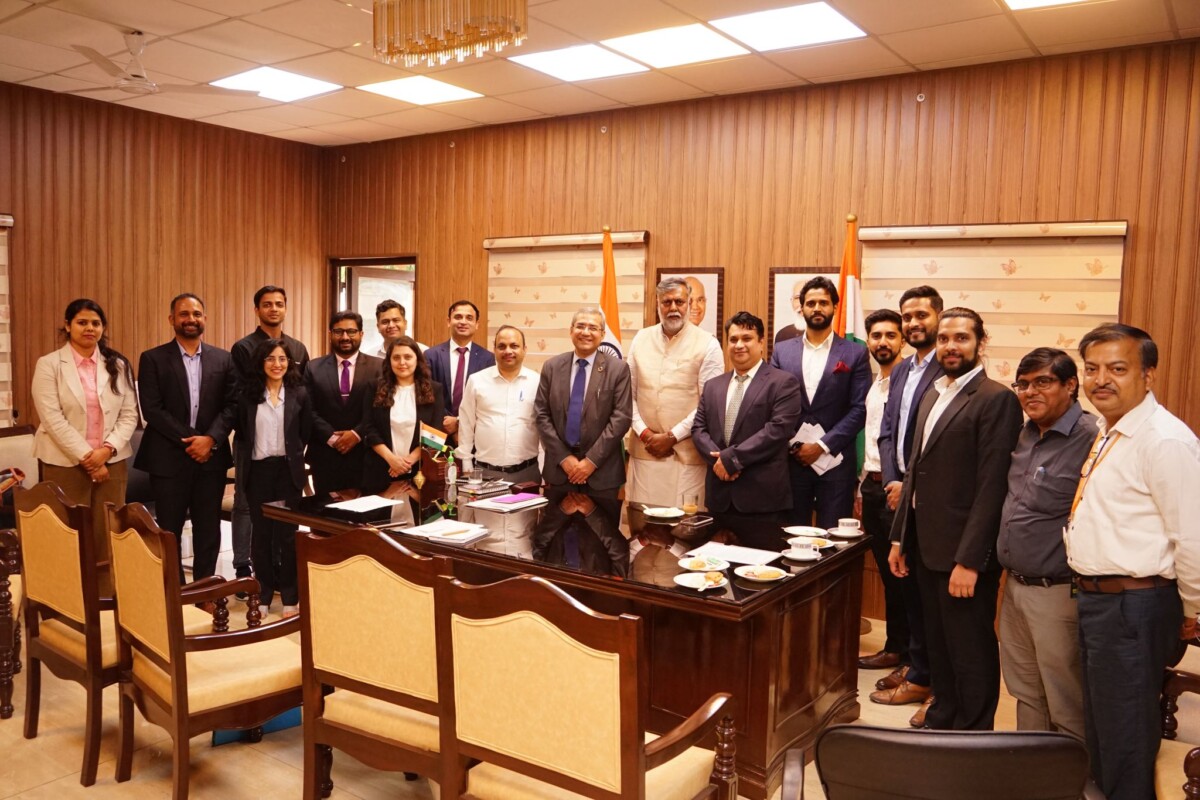-B Swaminathan (cbedit@imaws.org)
India’s plant-based food industry is currently in the nascent stage but holds huge potential for growth. The population of India is over 1.3 billion people, and the country has the highest number of vegetarians in the world, over 350 million. However, India has a limited number of manufacturers in this industry and the awareness level among the population is very low. As per survey estimates, around 80% of the population in India is protein deficient, while around 93% of the population is unaware of the daily protein intake requirement. These statistics show huge potential for plant-based food in India. In an exclusive chat with KitchenHerald.com, Sanjay Sethi, Executive Director, Plant Based Foods Industry Association (PBFIA), speaks on various aspects of plant-based food business. Edited excerpts.
Industry experts predict that India’s plant-based food market is set to cross the US$ 5 billion mark by 2032. What is your view:
PBFIA : The surging popularity of veganism coupled with increased environmental awareness has propelled the growth of the plant-based food and beverages market. The pandemic has also played a major role in changing consumer perceptions of dietary choices, with many people actively seeking plant-based food and beverages. As per The Insight Partners, the plant-based food market was valued at around US$ 33 billion in 2020 and is projected to grow at a CAGR of 12% from 2021 to 2028. The US, the UK, and Germany are the top three markets for plant-based food. Increased health awareness and product availability have aided market growth in these countries.
One major feedback many of the chefs speak on alternative meat is the cost. Why would people give 4 times the cost for an alternative while the original is available at an affordable cost for them?
PBFIA: If we compare processed meat products like salami, sausages, and burger patties with plant-based products like plant-based salami, plant-based sausages and plant-based burger patties, the difference in the price is not too much.
Cost of meat sausage: Rs500/ kg
Cost of plant-based sausage: Rs650/ kg
Cost of meat burger patty: Rs400/kg
Cost of plant-based burger patty alternative: 450/kg
Cost of dairy paneer: Rs400/kg Cost of Soy paneer: Rs160/kg
Cost of chicken meat: Rs350/kg Cost of soy chap: Rs100/kg
Cost of mutton meat: Rs700/kg
Cost of Soybean Tempeh: Rs750/kg
From the above examples, we can understand that plant-based products are not 4 times more expensive than meat-based products, especially in India. Moreover, if we compare plant-based foods like tofu or soya chap with dairy-based paneer and chicken respectively, we’ll find that the prices of plant-based products are ½ of what animal-based meats cost and that too, the cheapest meat is chicken. Mutton and beef are much more expensive than chicken and plant-based meat alternatives can be made using pea protein, soy protein, jackfruit and similar ingredients which are present in abundance in India and have a comparatively minimal negative impact on our environment.

Someone who consumes non-veg becomes a fish-out-of-water sitting in a pure-veg restaurant. While a vegetarian finds a maximum of 3 items in a non-vegetarian restaurant. In both cases, plant-based foods should be a good choice. What are the reasons why the HoReCa segments are still reluctant to include plant-based foods on the menu?
PBFIA: As mentioned, the plant-based food industry is still at a nascent stage in India. Moreover, HoReCa segments are very much connected to the education system in the hotel and hospitality management colleges because students of these colleges are the ones who’ll become industry leaders and sway the food trends towards sustainability, environment friendliness and animal friendliness.
After COVID-19 emerged, more and more people are getting aware of concepts like sustainability, animal welfare, environment protection, zoonotic diseases, human health and its connection with plant-based foods. With growing awareness, all the stakeholder institutions, organizations, food processing companies, hotels, restaurants, catering organizations, distributors, and individuals like entrepreneurs and investors are taking interest in this new yet revolutionary segment of plant-based foods.
In the coming 10 years, with collective efforts towards growing the Indian plant-based foods industry, we can definitely reach and even surpass the forecasted target of Rs. 40 Thousand crores by the year 2032.
While plant-based foods are evolving in India, what is the time frame it is expected to touch the mass population? (Like easily available in all retail and retail formats and not just only on the speciality stores)
PBFIA: The Indian plant-based foods market is supported by the growing number of restaurants, retail stores, and e-commerce platforms to cater to the vegan population. As per reports by Expert Market Research (EMR), the global vegan food market is forecast to grow substantially from 2022 to 2027, It is expected to touch the mass population in the next 5 years.
Even though the majority of the Indian population consumes meat, a big chunk of this population falls in the category of flexitarians. Indian flexitarians consume meat approximately 2-3 times a week and the rest of their meals are majorly plant-based as compared to Westerners where the majority of people eat meat every day or even in every meal. With growing prices of animal-based meat and growing awareness and demand for plant-based meat and dairy alternatives, price parity is within reach and so is mass adoption.
While most of the members are start-ups, how are you helping them scale up, provided that this is relevantly a new sector?
PBFIA: The Plant Based Foods Industry Association (PBFIA) is a CEO-led body which drives the plant-based industry forward in India. With sustainability and health as the key driving forces behind the activities of the association, the foremost aim of PBFIA is to make plant-based foods mainstream while providing new avenues for economic growth.
PBFIA is supporting the growth of a robust ecosystem for the plant-based food industry in India through strategic collaborations, by the creation of networks between stakeholders, facilitating research to enhance the capabilities of the sector, pushing for positive policymaking, and dissemination of key trends and information in the interest of its members.
- Together with its members, PBFIA applies its revered thought leadership and effective advocacy to generate constructive, technological, social and supply chain business solutions for the plant-based foods industry. To be a respected thought leader and advocate for a plant-based future for the food industry.
- PBFIA partakes in policy development to influence key decisions and create a favourable environment for the plant-based industry.
- PBFIA works towards bringing mentorship and investment opportunities for its member organizations.
- PBFIA will facilitate and support research and technology development, unique to the industry’s requirement, with a view to expediting the setting up and organizing of plant-based food start-ups and sustainable businesses, enhancing capabilities and building the capacity of the industry.
- PBFIA will develop case studies and measure the impact of the plant-based industry on the environment, the health of the people, its effect on land and other natural resources and sustainable development.
What are the key reasons the hoteliers and caterers should start inculcating plant-based veg foods in their menus?
PBFIA: The client base will be more diverse if the menu includes tasty vegan options, and the restaurant will be better equipped to serve just about any patron who walks through the door. Vegetarians, even Lacto-vegetarians who avoid eggs, can eat vegan food because it is inclusive and suitable for them. Some more benefits of including plant-based veg food on restaurant/ catering menus are as follows:
- Plant-based foods lead to lower food contamination and food-borne illnesses as compared to animal-based foods
- The cost of traditional plant-based foods is much lower than animal-based foods
- A plant-based food menu is something which almost everyone can eat. By everyone, we mean a vegetarian, a non-vegetarian, a vegan or a flexitarian – they all can eat plant-based food without any restrictions leading to a smaller menu as now you don’t have to prepare different dishes for different people. Plant-based foods cause low carbon emission, low water consumption and lesser soil erosion as compared to animal-based counterpart
- Plant-based foods have more fibre and micro-nutrients, which animal-based foods generally lack
- The new age plant-based food alternatives are fairly unique and arouse curiosity amongst consumers. Introducing innovative plant-based foods can be a showstopper at any food service outlet.
You are new in the market. Explain how are you planning to go ahead?
PBFIA: 1st Plant Based Foods Summit was hosted by Plant Based Foods Industry Association on 26th May 2022 and the event was supported by APEDA and MoFPI.
The Summit turned out to be revolutionary in every sense. More than 2000 registrations and 400 delegations honoured by the Minister of State for Food Processing Industries and Jal Shakti, Shri Prshald Singh Patel; position paper unveiled by Dr Sudhanshu, Secretary APEDA; impactful keynote speech by Ms Inoshi Sharma, Executive Director, FSSAI; US–India collaboration potential discussions by Ms Rachel Dreskin, CEO, PBFA USA, and other eminent speakers and panellists provided thoughtful insights; tastings by 40+ brands; embassy presence; vegan lunch and more than 50 media houses.
We will hold activities throughout the year to raise awareness about the sector and its opportunities, and we will also hold our flagship event, “Plant Based Foods Summit” next year, which will be even bigger. We are supporting other trade shows, events and exhibitions, like:
- India Foodex, Bangalore (Indian Food Expo 2022) – 26th to 28th August
- Plant-based World Expo, USA (Organized by Plant Based Foods Association) – 8th and 9th September
- India Food Forum, Mumbai (Organized by Images Group) – 7th and 8th December
The ultimate aim is to promote Indian plant-based foods startups and companies to realize their fullest potential, by removing barriers in the supply chain, policy advocacy, innovation, and investment.







